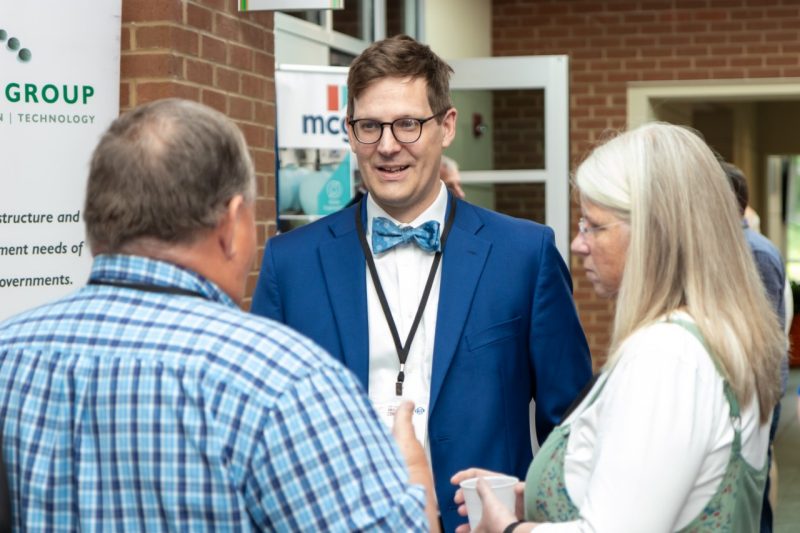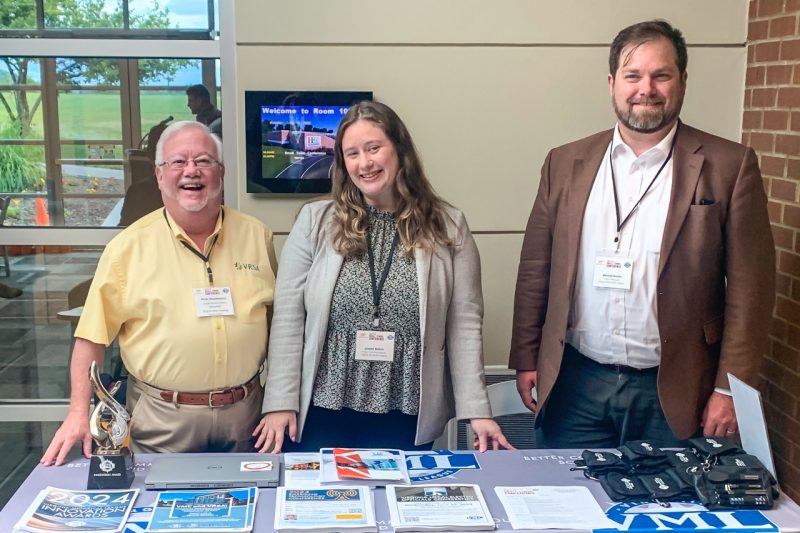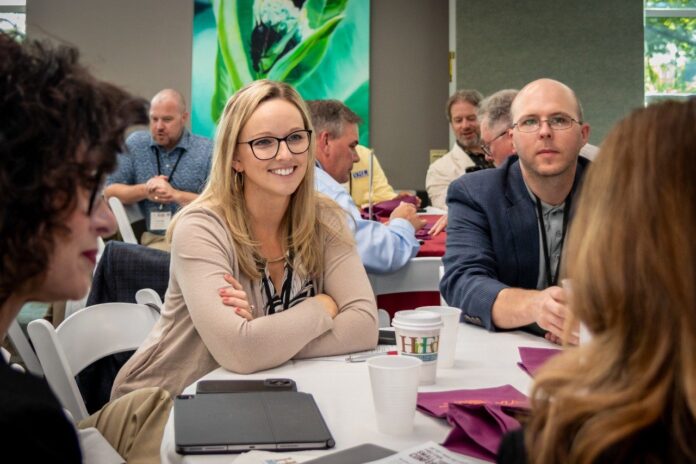From Pennington Gap in far Southwest Virginia to Kilmarnock on the Northern Neck, town leaders who serve populations of several thousand to just a few hundred came to the Virginia Tech Southwest Center in Abingdon for the first-ever Small Towns Conference.
Towns have different concerns from counties and cities, said LeAnna Surratt, who was recently promoted to town manager of Hillsville in Carroll County after serving as treasurer for many years.
“A lot of times, you’ll go to a conference and they’ll be talking about something that only applies to those larger municipalities, whereas, at this event, everything is applicable,” she said.
Highlighting resources, information, and connections that small towns need was exactly what Michelle Gowdy, executive director of the Virginia Municipal League (VML), had in mind when she reached out to Stephanie Davis, a collegiate associate professor with the Center for Public Administration and Policy; Scott Weimer, who leads the Virginia Tech Roanoke Center; and Allison Mays, director of the Southwest Center, about a partnership to develop the event.
“Working with local governments is one of the many ways Virginia Tech fulfills its land-grant mission,” Davis said. “With VML’s extensive experience serving the needs of town leaders paired with the university’s expertise in many critical concerns facing our small towns, we’re uniquely positioned to fill training gaps for our rural leaders.”
Conference sessions targeted topics that help small towns, including a keynote address delivered by placemaking expert and author Melody Warnick and a discussion panel of regional economic developers.
Leeanne Regon, who was named Tazewell’s town manager just a week prior, had her sights set on funding sources that could help her town grow. She joked that she hoped she’d find out about a secret portal to plug into.
While it’s not quite that easy, Del. Israel O’Quinn, who opened the gathering, said building that awareness of resources is what makes a conference like this so important.
“Convening like-minded people from across the state to share ideas and best practices helps make all of our towns better,” the Washington County resident said. “Not only do town leaders benefit from sharing stories of success, but also talking about some of the obstacles so that others can avoid them.”
Filling a gap
Mitchell Smiley, a Virginia Municipal League policy manager, said the conference provided an opportunity to put the tools in the hands of small-town leaders to tackle tough problems and create a place for them to ask questions while building connections with peers. Holding the event at the Southwest Center, he said especially helps those from Southwest Virginia, where many towns are closer to at least six other state capitals than they are to Richmond. That geographic gap can make networking and attending events like this more difficult.
Surratt said that’s an experience she’s had firsthand.
“If you’re in Southwest Virginia like I am, travel is a lot. You’ll be going to Roanoke or north for training,” she said. “At one point, we didn’t have a town vehicle to drive, so I would take my own car. Well, then we wouldn’t have money to put gas in it, so I’d use my own gas. Same with the hotel. And then, if you have a very small staff, do you close the town office so you can attend training? It’s hard.”
But, Surratt said, opportunities to connect and swap stories with one another are crucial.
The nearly 100 attendees shared plenty of “if you know, you know” chuckles as they connected over “only in a small town” tales. One such saga, for example, involved residents of the town of Stuart who were dismayed over the whereabouts of Thomas Stuart, the cat who calls the collective businesses of Main Street home. Another concerned the flurry of planning that goes into a festival that doubles the population of The Plains in Fauquier County for a weekend each year.
Creating those connections are a central part of the mission of the Southwest Center, located in the Southwest Virginia Higher Education Center. One of the four Commonwealth Campus Centers that are part of Outreach and International Affairs, it serves as a gateway to the university. The centers — with other locations in Roanoke, Richmond, and Newport News — offer valuable educational opportunities such as professional development, customized workforce training, and graduate programs, as well as acting as conveners of university and community expertise to solve problems.
“This conference is a prime example of how the Southwest Center links regional needs with university resources,” Mays said. “Through this vital community engagement, we’re helping support and build strong towns across Virginia.”

Putting the ‘there there’
“Create a place that captures people’s hearts,” Warnick, a writer in Virginia Tech’s Office of the Executive Vice President and Provost and author of “This Is Where You Belong” and “If You Could Live Anywhere,” said as she spoke about the importance of developing a place where residents and visitors alike can find joy.
With her own family’s move to Blacksburg from Austin, Texas, as the backdrop, she shared with town leaders the types of events and amenities that helped her grow attached to her new, much smaller town. She also discussed research that shows how people, no matter where they live, find community connection.
It turns out, the nuts and bolts of putting the “there there” in small towns is up to the community, Warnick said. Whether it’s a new park, farmers market, mural, or festival, getting residents engaged in making the town a place where they want to be is key.
Other speakers covered the gamut of concerns facing town leaders. The audience heard from legal experts, economic developers, and leadership coaches from the region, as well as several Virginia Tech faculty members:
- Mel Jones O’Brien, associate director of the Virginia Center for Housing Research in the Myers-Lawson School of Construction, who walked through housing concerns that plague small places. She advised that working together as a region can help attract housing developers.
- Sheryl Bailey, visiting professor of practice in the School of Public and International Affairs, who provided a regional and statewide economic analysis.
- Davis, who led sessions on calculating the money a town needs to meet its goals and the importance of prioritizing goals.

As the final session came to a close, Clifton Forge Town Manager Chuck Unroe and Town Council member Debbie Laudermilk prepared for their three-hour drive back to the Allegheny Highlands loaded with information that could help their town of 3,500 people as well as connections that they could lean on in the future.
“It’s a privilege to interact with other town leaders and realize that, at the end of the day, we’re not going through our issues alone.”
Go to the Virginia Tech Engaged website to view a photo gallery from the conference and find out how Hokies are helping create real solutions across the commonwealth and beyond by subscribing to the Virginia Tech Engaged e-newsletter.
By Diane Deffenbaugh


